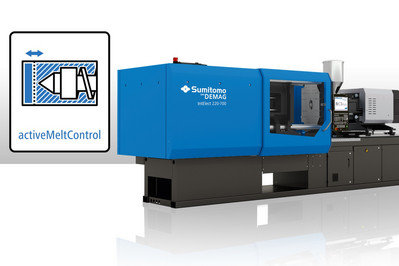activeMeltControl (aMC) is an adaptive, fully automatic control process integrated into the machine's control system, providing greater process continuity. This, in turn, generates various effects that benefit sustainable manufacturing.
"With aMC, we can compensate for shot weight variations in nearly all applications and materials, whether it's due to batch fluctuations, recyclables, regrind, drying differences, dosing variations, or the use of additional additives," explains Dr. Thomas Schilling, Product Manager for Digital Solutions. For example, shot weight fluctuations in 100% recycled material can be corrected by the software, bringing it to the level of virgin material. "This significantly reduces the customer's reject rate. Depending on the process and material, it goes towards zero."
The result of more consistent part weights throughout the batch is a very rapid return on investment (ROI), assures Schilling. Additionally, it leads to better process consistency, longer machine uptime, and reduced scrap, all contributing to greater sustainability. A lower reject rate results in higher output, increasing efficiency and conserving resources. "Furthermore, customers benefit from greater manufacturing flexibility, as a wider range of material variations can be accommodated when using PCR/PIR types."
The background for this development, which Sumitomo (SHI) Demag has vigorously pursued over the past four years, is the changing quality of plastics with fewer virgin materials and more recyclable content. "Many customers have requested a digital solution to compensate for these variations in our highly efficient and precise machines. That's why we introduced aMC as a completely independent software module alongside our established active modules," explains the Product Manager for Digital Solutions.
It can be easily activated with a single click and runs fully automatically in the background. "The software compensates for viscosity fluctuations and backflow barrier leaks, adjusting the pressure accordingly. Customers can tailor it to their specific process needs and respond to the machine's characteristics using an adjustment controller," reports Schilling. Initially, aMC will be available for all IntElect 2 series full-electric injection molding machines from the first quarter of 2024, with retrofits planned for the future.
Furthermore, Sumitomo (SHI) Demag has optimized its Smart Solution, myAssist, for easier usability. The software enhances process transparency for injection molders by providing more insights into process parameters. "We are transforming myAssist into a digital process companion. We have optimized interfaces, improved data collection and visualization," says Schilling. The user interface is now flexible and customizable to individual customer preferences, allowing for the representation of cycle- and time-based data. Users can create custom dashboards with material or consumption data or define their own key performance indicators (KPIs) to track the process.
"We've improved process stability and performance while reducing data volume for better transmission. Additionally, myAssist offers more data exchange and analysis possibilities, as well as improved connectivity to other systems," adds the expert. It also includes a high-speed knowledge database with I/O interfaces as a basic system for IoT 4.0. An HVI (Human Virtual Interface) and an expertise module provide options for manual process annotations. Moreover, myAssist connects all new IntElect machines.
myAssist also aligns with the "Act! Sustainably" motto by reducing downtime and optimizing resources and capacities. It also supports the global traceability standard for plastic products, R-Cycle, through QR codes, material labels, end products, and the upload of production data. "myAssist is future-proof, as it serves as our foundation for future cross-process AI applications. AI learns faster, analyzes more accurately, and adapts better. It can contribute to greater sustainability and efficiency," concludes Schilling.

